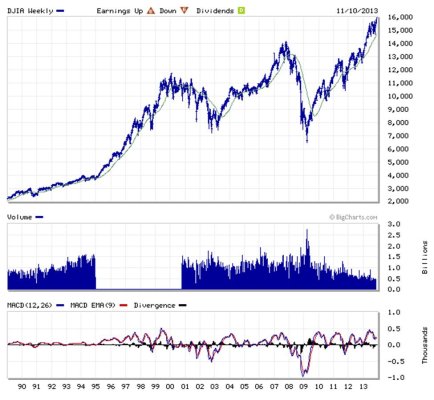What a wonderful forum! I'm 54, love Vanguard, save as much as I can for retirement, and have been thinking about a lot of the topics you discuss here for awhile. It's great to find a community of people focused on these issues.
My question has to do more with your own level of confidence as you retired than Firecalc predictions. I have run the numbers, and it looks ok objectively. But I do still enjoy the work, so I am not in a big hurry. What I do want is to feel confident that I would not merely be able to retire, but that I could afford the level of retirement that I want.
To me, there is a level of 'survival' readiness, meaning a person could, by living frugally and being willing to make some trade-offs, provide for the basics and a treat (a little cheap travel?) every now and then if they retired.
Then, there is 'security', which to me is a higher level of confidence than mere survival. For me, this would include a bit more in the way of assets, no debt at all including no mortgage, and a bit more wiggle room in the budget, but not luxury.
Up a little further is a level I consider 'comfort', which does include some luxury but not a crazy level of wealth.
Beyond that, there is a level I consider 'no worries', where a person could indulge a great deal in luxury, would be able to leave a significant estate, and would never have to worry at all about running out of money or making financial compromises.
For now, I am at the 'survival' level of retirement readiness, so if I had to because of some health or family event, or a change in the job situation, I could survive but would not be as secure as I'd like. I'd like to get to 'comfort', which will take me a number of years of continued employment.
Where are you on this? Does it change -- when you retire, after a year or two did you become more or less secure about how you felt about your assets?
Thank you for the great ideas.
My question has to do more with your own level of confidence as you retired than Firecalc predictions. I have run the numbers, and it looks ok objectively. But I do still enjoy the work, so I am not in a big hurry. What I do want is to feel confident that I would not merely be able to retire, but that I could afford the level of retirement that I want.
To me, there is a level of 'survival' readiness, meaning a person could, by living frugally and being willing to make some trade-offs, provide for the basics and a treat (a little cheap travel?) every now and then if they retired.
Then, there is 'security', which to me is a higher level of confidence than mere survival. For me, this would include a bit more in the way of assets, no debt at all including no mortgage, and a bit more wiggle room in the budget, but not luxury.
Up a little further is a level I consider 'comfort', which does include some luxury but not a crazy level of wealth.
Beyond that, there is a level I consider 'no worries', where a person could indulge a great deal in luxury, would be able to leave a significant estate, and would never have to worry at all about running out of money or making financial compromises.
For now, I am at the 'survival' level of retirement readiness, so if I had to because of some health or family event, or a change in the job situation, I could survive but would not be as secure as I'd like. I'd like to get to 'comfort', which will take me a number of years of continued employment.
Where are you on this? Does it change -- when you retire, after a year or two did you become more or less secure about how you felt about your assets?
Thank you for the great ideas.


 Boy was I wrong. I've been socking a good chunk of my salary away to my 401k plan for over 25 years but after finding this site and seeing how little I have compared to most of the posters here, it ain't gonna happen anytime soon. I thought I had a nice nest egg until I started reading the posts here where people will ask with a straight face if they have enough to retire on and you read their portfolio and they've got a couple million in assets
Boy was I wrong. I've been socking a good chunk of my salary away to my 401k plan for over 25 years but after finding this site and seeing how little I have compared to most of the posters here, it ain't gonna happen anytime soon. I thought I had a nice nest egg until I started reading the posts here where people will ask with a straight face if they have enough to retire on and you read their portfolio and they've got a couple million in assets